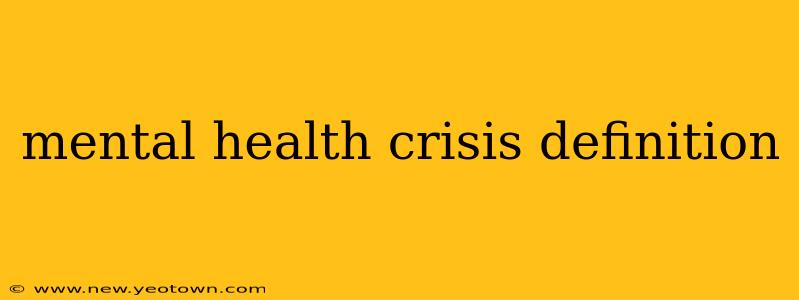A mental health crisis is a period of intense emotional distress or instability that significantly impairs a person's ability to cope with daily life. It's not just feeling down or stressed; it's a situation where the individual's well-being is severely threatened, potentially leading to self-harm or harm to others. Imagine a dam holding back a raging river; a mental health crisis is when that dam is close to breaking, threatening to unleash a devastating flood of overwhelming emotions. This isn't a fleeting moment of sadness, but a significant and urgent event demanding immediate attention.
What are the signs of a mental health crisis?
Recognizing the signs of a mental health crisis is crucial, both for the individual experiencing it and for those around them. These signs can vary greatly depending on the individual and their specific circumstances, but some common indicators include:
- Intense emotional distress: This might manifest as overwhelming sadness, anxiety, fear, anger, or a feeling of being completely overwhelmed. It's not the normal ups and downs of life; it's a level of distress that feels unbearable.
- Suicidal thoughts or self-harm: This is a critical warning sign and requires immediate intervention. Any mention of suicide, self-harm, or harming others should be taken extremely seriously.
- Significant changes in behavior: This could include sudden changes in sleep patterns, appetite, hygiene, or social interactions. A person might withdraw completely from social contact, become excessively agitated, or engage in risky behaviors.
- Loss of contact with reality: This can involve hallucinations (seeing or hearing things that aren't there) or delusions (fixed, false beliefs). It’s a sign that the individual’s perception of reality is severely distorted.
- Inability to function: The person may be unable to perform basic daily tasks, such as going to work, school, or caring for themselves. Simple tasks can feel insurmountable.
What causes a mental health crisis?
The causes of a mental health crisis are complex and often multifaceted. They can include:
- Untreated or poorly managed mental illness: Conditions like depression, anxiety, bipolar disorder, schizophrenia, and PTSD can all trigger a crisis if left untreated or if the treatment plan is inadequate.
- Traumatic events: Significant life events, such as loss of a loved one, job loss, abuse, or natural disasters, can overwhelm a person's coping mechanisms, leading to a crisis.
- Substance abuse: Alcohol and drug use can exacerbate underlying mental health conditions and trigger a crisis. Substance withdrawal can also be a significant contributor.
- Stress and pressure: Chronic stress from work, relationships, or financial difficulties can build up over time, eventually leading to a crisis.
- Lack of support: A lack of social support, feeling isolated and alone, can significantly worsen a mental health crisis.
How long does a mental health crisis last?
The duration of a mental health crisis varies greatly depending on the individual, the underlying cause, and the availability of support and treatment. Some crises may resolve relatively quickly with appropriate intervention, while others may last for days, weeks, or even longer. The crucial factor is seeking help as soon as possible. Prompt intervention can significantly shorten the duration and severity of the crisis.
What to do during a mental health crisis?
If you or someone you know is experiencing a mental health crisis, it's imperative to seek immediate help. Here's what you can do:
- Contact emergency services: Call 911 or your local emergency number immediately if there is immediate danger to self or others.
- Go to the nearest emergency room: Emergency rooms can provide immediate stabilization and assessment.
- Reach out to a crisis hotline: Many regions offer 24/7 crisis hotlines staffed by trained professionals.
- Seek professional help: Connect with a therapist, psychiatrist, or other mental health professional for ongoing support and treatment.
How can I prevent a mental health crisis?
While it’s impossible to completely prevent all mental health crises, proactive steps can significantly reduce the risk:
- Early detection and treatment of mental illness: Regular checkups with a mental health professional and early intervention can prevent crises from developing.
- Developing healthy coping mechanisms: Building resilience through activities like exercise, mindfulness, and connecting with supportive people can help manage stress and prevent crises.
- Managing substance abuse: Addressing substance use disorders through treatment and support is essential to prevent crises.
- Building a strong support system: Having a network of friends, family, and professionals can provide crucial support during challenging times.
Facing a mental health crisis can be incredibly daunting, but it's vital to remember that you're not alone and help is available. Taking proactive steps, seeking support, and understanding the signs can make a significant difference in navigating these challenging times and finding a path toward recovery. Remember, hope is always present.

